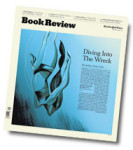Literary Darling of the New Year: Chang-rae Lee
Gathering the most reviews of the new year is the new novel by Chang-rae Lee, On Such A Full Sea, (Penguin/Riverhead; Penguin Audio; Thorndike), which arrives on Tuesday. In a cover review in the New York Times Book Review, Andrew Sean Greer (The Impossible Lives of Greta Wells) announces he is a fan from the opening paragraph,
Watching a talented writer take a risk is one of the pleasures of devoted reading, and On Such a Full Sea provides all that and more. It’s a wonderful addition not only to Chang-rae Lee’s body of work but to the ranks of “serious” writers venturing into the realm of dystopian fantasy.
Lee didn’t set out to write a dystopian novel, but a social realist novel about Chinese factory workers, as he tells the NYT BR editor, Pamela Paul in this week’s “Inside the New York Times Book Review” podcast. Instead, he ended up writing about an enclosed settlement of Chinese-American refugees in a city called “B-Mor,” built on the ruins of Baltimore. He sees that city as a symbol of “a certain kind of urban decay,” but admits his only contact with it has been the view from a train window (something he has in common with songwriter Randy Newman who, 35 years ago, wrote the bleak song “Baltimore” based on the same experience. Up in arms, the city insisted on a visit and an apology).
The majority of the rest of the reviews equal the NYT BR in their praise:
Los Angeles Times – ‘On Such a Full Sea’ a cautionary tale of the future —
Who is a greater novelist than Chang-rae Lee today?
His new, his fifth — where have you been? — book seals this deal. A chilling, dark, unsettling ride into a dystopia in utopia’s guise, this is a novel that might divide but will no doubt conquer where it matters most.
Chicago Tribune – Review: ‘On Such a Full Sea’ by Chang-Rae Lee —
… not just a fully realized, time-jumping narrative of an audacious young girl in search of lost loved ones, but an exploration of the meaning and function of narrative, of illusion and delusion, of engineered personalities and faint promises of personhood, and of one powerful nation’s disappearance and how that indelibly affects another.
Entertainment Weekly — ON SUCH A FULL SEA Chang-rae Lee — A-
The dystopia of On Such a Full Sea isn’t showy … instead Lee relies on specific, indelible images … and his usual perceptive writing to get at the warped morality that can drive a world into decline.
Cleveland Plain Dealer — Chang-Rae Lee charts a rocky course toward freedom
A new book by Lee is cause for giddy expectation … His latest … is both a detour and a confirmation: a detour because, as a dystopian vision, it is unlike his previous narrative forms; a confirmation, because despite that difference, his prodigious talents are still everywhere evident.
There are a couple of holdouts, however:
San Francisco Chronicle — On Such a Full Sea,’ by Chang-rae Lee
On some level, “On Such a Full Sea” feels totally characterless. It continually keeps the reader at arm’s length, declining to make us care much about its nearly faceless heroine…In part, this is due to the novel’s nature as a cautionary tale…As a consequence, the narration is rendered in a flat, somewhat formal, old-fashioned style that never allows us to get too close to the story’s emotional truth. For all its plot convolutions, the book still feels abstract and cold.
New York magazine, “A No-Frills Buyers’ Guide to January Books“:
The tired dystopian tropes Lee uses to evoke our current predicament—stratified societies, cruel market forces, a broken health-care system, etc.—are so heavy-handed that the book sometimes reads more like a diagnosis than a believable human story.


